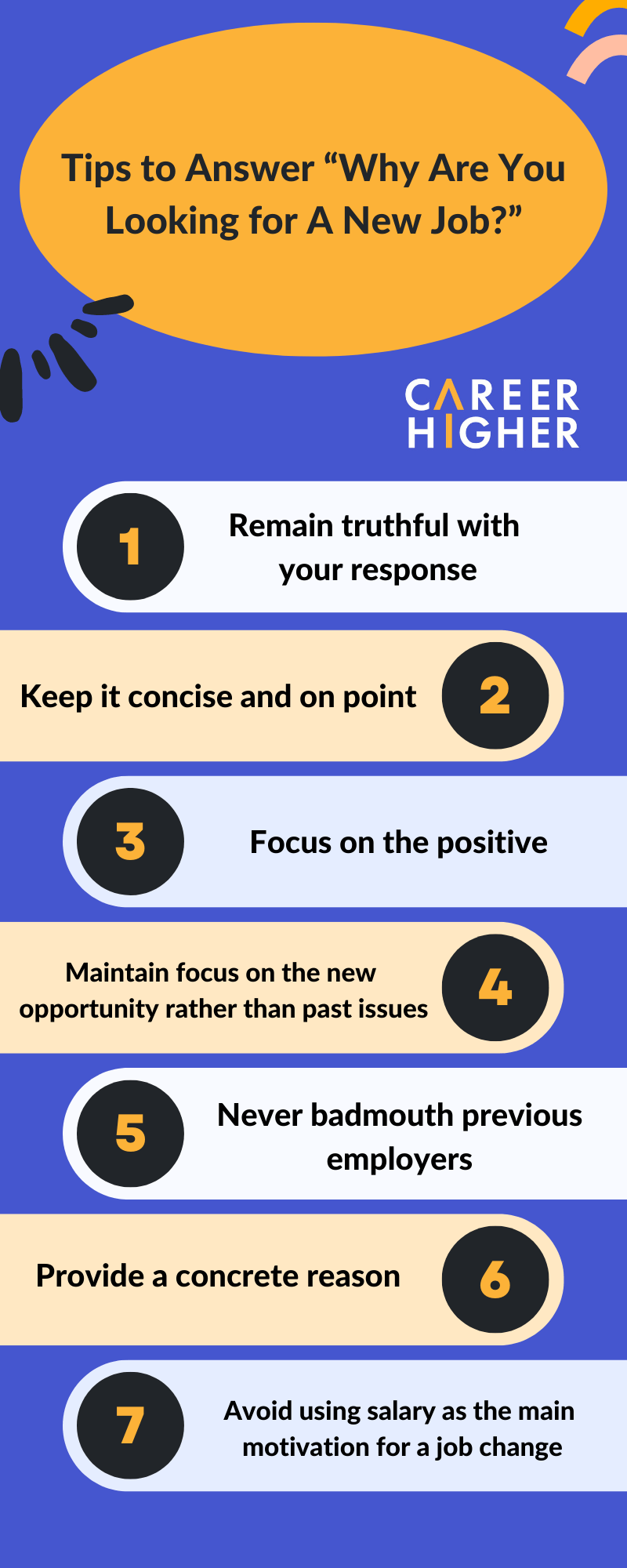Table of Contents
When you’re interviewing for a job, the interviewer is likely to ask why you’re looking for a career change. This may seem like a straightforward question. However, it can be tricky to answer, especially if your circumstances are not rosy. Regardless of your reason, it is essential to frame your answer in a way that reflects positively on you.
Failing to provide a good response may create the wrong impression that you are unprofessional or uncommitted, which can hurt your chances of landing your dream job. However, crafting a convincing answer is easier said than done for some job seekers. If you’re one of them, keep reading as we dig deep into how to answer, “Why are you looking for a new job?”
Why Do Employers Ask This Question?
Understanding why employers ask “Why are you looking for a new job?” is crucial in navigating this common interview question effectively. Employers pose this question not merely as a formality but as a strategic probe into your professional life and aspirations. By exploring your reasons for a job change, employers aim to gauge how well you will fit into their organization, both culturally and operationally.
Employers typically look to uncover several key insights about potential hires through this question:
1. Assess motivation: Employers want to ensure that candidates are genuinely interested in the role and are not merely trying to escape an unfavorable job situation. This helps them identify applicants who are likely to be engaged and passionate about their work.
2. Check cultural fit: Insights into why you left your last job can indicate whether you will integrate well into the new company’s environment. Employers are keen on candidates who not only have the right skills but also share the company’s values and work ethic.
3. Understand candidate’s commitment: Companies invest significant resources in training new hires; thus, understanding the reasons behind a candidate’s job change helps predict their future trajectory and commitment to the company. Employers prefer candidates who are likely to contribute over a long time. They would pay close attention to any red flags that may come up during the interview, such as poor work ethic or lack of commitment.
In some cases, the interviewer may phrase the question slightly differently. However, the underlying message remains the same. Here are alternative questions employers may ask:
- What prompted you to apply to this position?
- Why are you looking to change your job?
- Why are you interested in working for this company?
- What made you quit your last job?
How to Answer “Why Are You Looking for a New Job?”
Crafting an effective response to this question involves several strategic elements. A good answer not only satisfies the interviewer’s curiosity but also enhances your candidacy. Follow these steps to build a compelling answer:
Step 1: Maintain Professionalism
Begin your response by focusing on the constructive aspects of your current or previous role. While it’s important to be honest about your reasons for leaving, avoid speaking negatively about your employer. This approach helps you demonstrate maturity and professionalism, even if you faced significant challenges.
Example: “In my current role at Company X, I’ve had the opportunity to work with a talented team and develop my project management skills. We’ve successfully completed numerous projects that have contributed significantly to the company’s goals. I’m grateful for these experiences as they have prepared me for more complex challenges.”
Step 2: Clarify Your Motives
Clearly articulate why you are seeking a new job. You might want to take on new challenges, change industries, seek better career growth opportunities, improve work-life balance, or relocate due to personal reasons. Try to align your reasons with the job you are applying for.
Be honest but strategic. For example, if you are relocating because of a spouse’s job, link this personal decision to your professional aspirations. This shows that you are thinking about your career in the context of your life circumstances.
Generally, one to two minutes should be sufficient to summarize the main points of your argument. You may expand upon those points if asked to elaborate further.
Example: “While I’ve greatly enjoyed my work, I am looking to relocate to New York to be closer to my family. This move aligns with my personal life changes, and I’m excited about the opportunity to join a company like yours that is a leader in the tech industry. I believe this change will allow me to leverage my skills in a major market and contribute effectively in a new setting.”
Step 3: Highlight Growth and Learning
Whenever possible, discuss what you have learned in your current or previous roles and how you are looking to expand those skills or experiences. This might involve speaking to specific projects that have prepared you for the next step in your career or skills you’ve developed that are particularly relevant to the new job. Demonstrating how past experiences have equipped you for future roles is crucial.
Example: “Over the past three years, I have honed my skills in digital marketing, particularly in the realm of social media strategy, achieving a 40% increase in engagement for our main product lines. I’m now looking to expand my expertise in a more diverse product environment like yours, which I see as an excellent opportunity to apply and further develop my strategic planning abilities.”
Step 4: Focus on the Future
Conclude your answer by aligning your career goals with the potential new role. Discuss how your skills and experience make you an ideal fit for the position and how you plan to contribute to the company. It’s beneficial to express enthusiasm for what the new company is doing, especially if you can cite specific projects or directions that excite you.
Example: “I am particularly impressed by your company’s commitment to innovation and sustainability. I feel my background in environmental science, combined with my recent project management experience, aligns perfectly with your upcoming initiatives in sustainable development. I am eager to contribute to these projects and help drive the company’s green objectives forward.”
Step 5: Manage Risks
If you think your answer could raise doubts, address these concerns proactively. Be prepared to discuss any potential concerns the employer might have based on your reasons for leaving previous jobs. If your job changes have been frequent, be ready to provide a valid reason and explain how this new opportunity represents a long-term commitment for you.
Example: “I realize that my resume shows a transition every two to three years, which might raise concerns about my longevity. However, each move was a strategic step to enhance my skills and take on greater responsibilities. This position at your company represents what I see as a long-term opportunity where I can settle and grow, aligning with my career goals and personal values.”
Why Are You Looking for A New Job: Best Answers
Every job seeker has different reasons for exploring new opportunities. While these reasons may vary greatly from person to person, there are some common scenarios that people tend to experience during their careers that are likely to lead them to search for a new opportunity. The list below provides some of the most common reasons why people look for a change and examples of the best answers for each scenario.
1) Better compensation
A good way to communicate this is by emphasizing your value to the company and how your expertise will help the organization succeed. Avoid specifying salary figures or ranges at this stage. The only exception is if the interviewer specifically asked for your desired salary amount.
Answer Example: “I want to work for a company that genuinely values the expertise and experience of its employees over the long term, pays them competitively, and provides benefits in line with that value. Your company’s reputation in the marketplace, as well as the value you place on your employees and their professional development, make me really excited about the prospect of working for XYZ Company. I believe that my strengths in project management and data analysis would be a great asset to the business and position me to make a real impact as a member of your team.”
2) Opportunities for career growth
The best way to use this as an answer is by expressing your interest in continuing your career growth within the field and expanding your professional skill set in the process. Describe the goals you have for yourself and explain how they align with the opportunities offered by the job. Additionally, make sure to discuss how you would make the most of the position and the skills you already have in order to set yourself up for a successful transition into the new role.
Answer Example: “I’ve worked in the retail industry for the last 15 years. While I’ve enjoyed the experience and the people I’ve worked alongside, I feel that it’s time for me to explore new opportunities and take the next steps in my career. Currently, I am looking for a role in a related field where I can utilize my experience in a management capacity and apply my skills to a broader range. I see your company as a perfect match for my skills, experience, and career goals, and I believe that I could make an impact on your team in this role.”
3) Toxic culture or negative work environment
Even if you’re quitting a toxic culture or negative environment, it’s still best to focus on how you can benefit future companies rather than criticize the one you just left. Try to use this opportunity to mention how you plan to take the positive parts of your previous role and apply them to the new opportunity. This demonstrates your maturity and professionalism, which is much more attractive to potential employers than complaints about your old company.
Answer Example: “I am seeking to join an organization with a culture and environment that aligns with my values and interests. Reading about your company, I can see that it offers an environment that is both professional and friendly, which I feel would be a good fit for my personality. In addition, I’ve gained a lot of experience in a similar field and am confident that I could leverage this experience to make an impact on the work that you do at your organization.”
4) Industry or career change
If you’ve decided it’s time to switch industries or careers, you’ll need to clearly explain why you’re making the move and how the new path fits into your long-term plans. When explaining why you are changing career paths, emphasize how your past experience and skill set have prepared you for the new position and how your future goals match those of the prospective employer. Explain that you are open to new experiences while remaining committed to your long-term career objectives.
Answer Example: “After five years of working in sales, I’ve decided that I want to pursue a career that is more aligned with my interest in business development. My sales experience has taught me valuable skills that will be useful as I transition into my new role, including the ability to build rapport with clients and close deals in a competitive environment. I am open to taking on new challenges and gaining new skills that will further my career growth in the new field.”
5) Involuntary termination
If you left your last job or were let go under less-than-favorable circumstances, it is important to be clear about why your employment was terminated and present this information without anger or bitterness. Focus on facts when describing the circumstance of your departure. Avoid being defensive or blaming others for your predicament. Instead of making excuses for your dismissal, focus on how you bounced back from your setback and how you can deliver value to your new employer.
Answer Example: “After four years with my previous employer, I was terminated as part of the company-wide restructuring initiative. The company cited economic factors as the reason for the decision. Although this came as a surprise, I feel that this layoff was the best and have accepted the changes that have taken place. I am excited about starting a new chapter in my career and confident that my experience in marketing would allow me to make a positive impact in this new role.”
How to Prepare for “Why Are You Looking for a New Job”
Preparing effectively for the common interview question, “Why Are You Looking for a New Job?” can set the stage for a successful interaction with potential employers. Here’s how you can prepare for this question:
1. Research the role and the company
Thoroughly review the job description to understand the required skills, projects, qualifications, and scope of work. Align your answer to show that what the job is offering is exactly what you are looking for.
Research the company beyond surface-level information. Understand its mission, culture, strategic goals, and recent news. For example, if the company prides itself on innovation, emphasize your passion for cutting-edge work and how it aligns with your career aspirations.
To gather this information:
- Explore the company’s website, particularly the “About Us” and “Careers” sections, to understand its mission, values, and what it offers to its employees.
- Check the company’s LinkedIn, Facebook, Twitter, and Instagram profiles to get a sense of their corporate culture and recent achievements.
2. Reflect on your professional journey
Consider your current job and the reasons you want to leave. Be honest with yourself about these reasons—are they related to career advancement, work-life balance, or perhaps challenges in the workplace?
Align your reason for leaving with your long-term career objectives. For instance, if you are looking for growth opportunities that your current job cannot provide, explain how the new job offers the potential for such growth.
3. Practice your responses
Practice your answer to this question with a friend, mentor, or with an interview specialist. This practice can help you refine your delivery and ensure your answer is coherent and polished. Use feedback to fine-tune your response, focusing on maintaining a positive tone and keeping your answer succinct yet informative.
4. Anticipate follow-up questions
Employers might probe deeper based on your answer. Be ready to discuss specific aspects of your job search, such as why you chose their company or how you see yourself fitting into their culture. Think about potential scenarios based on your answer that could lead to follow-up questions and prepare your responses accordingly.
Possible Follow-Up Questions
After answering “Why are you looking for a new job?”, the interviewer might ask follow-up questions to delve deeper into your motivations, experiences, and fit for the role. Here are some common follow-up questions:
- Why did you leave your last job?
- Where do you see yourself in 5 years?
- What is your greatest weakness?
- What are your salary expectations?
- Can you describe a time when you faced a significant challenge at work and how you handled it?
- What did you like the most about your last job?
- What motivates you to perform well at your job?
Conclusion
Answering “Why are you looking for a new job?” effectively can set a positive tone for the rest of your interview. By understanding the intent behind the question, avoiding common pitfalls, and tailoring your response to reflect your professional goals and the company’s values, you can turn a potentially tricky question into an opportunity to shine. If you need any additional help or guidance with interview preparation, feel free to reach out, and we will be happy to assist you.












